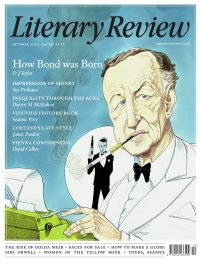Daniel Swift
Print for Victory
The Book at War: Libraries and Readers in an Age of Conflict
By Andrew Pettegree
Profile Books 480pp £30
In December 1940, as German bombs were falling on London, Virginia Woolf was reading ‘a very accurate detailed book’ about the Great Fire of London three centuries before. Like the country, Woolf was in a crisis this winter. ‘What is the phrase I always remember – or forget’, she wrote in her diary, and then slightly misquoted a line from a poem by Walter de la Mare: ‘Look your last on all things lovely.’ She consoled herself ‘musing; reading; cooking; cycling; oh & a good hard rather rocky book.’ ‘This is my prescription,’ she wrote. She was being gently ironic, for she knew that books would not save her. In less than three months, she would be dead by suicide, and the war would go on.
‘We tend to assume books and literary culture have a positive impact on the world, informing, enlightening, assisting the cause of progress,’ notes Andrew Pettegree at the start of his wide-ranging The Book at War. This is Woolf’s ‘prescription’: the old liberal humanist idea that literature can transport us to a different, purer world and teach us ethical values. But books, Pettegree argues, were central to the wars of the 20th century. The two world wars, he observes, were fought between ‘the world’s most bookish nations’. Even more than this, ‘the Second World War pitted in opposition war leaders who were also bestselling authors’. The journalist and memoirist Winston Churchill later won the Nobel Prize in Literature; Adolf Hitler, author of the bestselling Mein Kampf, had a good library. A work by another leading combatant, Mao’s Little Red Book, eventually sold something like a billion copies.
What such figures shared was a ‘belief in the power of the written word to shape the destiny of nations’. Pettegree traces the practical and symbolic roles played by books and literary culture in modern wars. It’s a vast subject and Pettegree takes us on a remorselessly interesting

Sign Up to our newsletter
Receive free articles, highlights from the archive, news, details of prizes, and much more.@Lit_Review
Follow Literary Review on Twitter
Twitter Feed
Literary Review is seeking an editorial intern.
Though Jean-Michel Basquiat was a sensation in his lifetime, it was thirty years after his death that one of his pieces fetched a record price of $110.5 million.
Stephen Smith explores the artist's starry afterlife.
Stephen Smith - Paint Fast, Die Young
Stephen Smith: Paint Fast, Die Young - Jean-Michel Basquiat: The Making of an Icon by Doug Woodham
literaryreview.co.uk
15th-century news transmission was a slow business, reliant on horses and ships. As the centuries passed, though, mass newspapers and faster transport sped things up.
John Adamson examines how this evolution changed Europe.
John Adamson - Hold the Front Page
John Adamson: Hold the Front Page - The Great Exchange: Making the News in Early Modern Europe by Joad Raymond Wren
literaryreview.co.uk